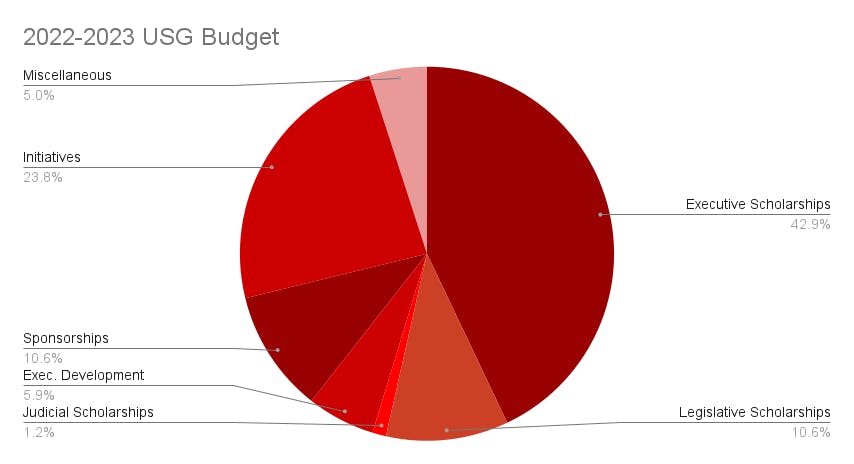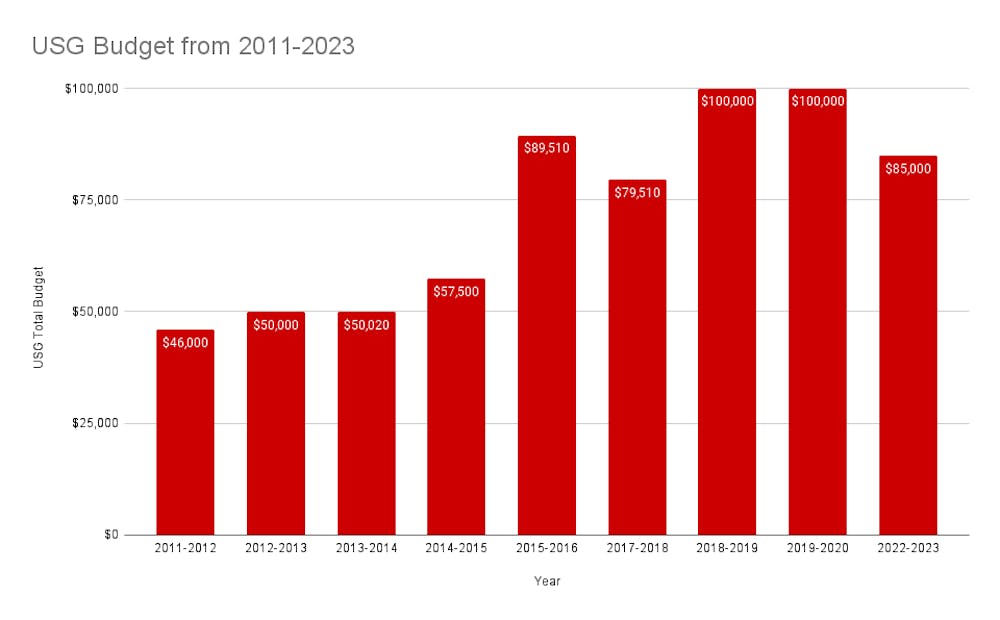The Undergraduate Student Government (USG) at IUPUI cites their mission as being, “committed to improving the student experience by representing the student body, supporting student-led organizations on campus, addressing student concerns." According to their site, USG provides a platform for student involvement, while providing education surrounding social justice, diversity, equity and inclusion.
While USG does provide support to students, their funding has been underutilized, diluting the impact the organization could be making at IUPUI. There is a fundamental disconnect between USG and the needs of organizations at IUPUI, one that USG acknowledges themselves.
Back in 1972, the Sagamore, IUPUI’s original student newspaper, reported the annual budget for their Campus Student Senate as being $376.21, equating to about $2,709 today, all funded locally through USG itself. That is compared to the 2022-2023 annual budget of $85,000 which is provided to them by the university.
Years ago, these annual budgets were only about half of what it is now. In 2011-2012, the annual budget for USG was $46,000 with $13,100 allocated to programs and events (approximately 28.5% of annual budget). In 2011 they also had $18,000 allocated for salaries/wages for the people on the board (approximately 40% of annual budget).

This is compared to 2015-2016 where their budget nearly doubled to $89,510 with $35,000 (approximately 40% of annual budget) allocated to stipends/scholarships for the officers/members. They had $7,800 allocated for programs and events and $10,000 allocated to professional development and enrichment which, combined, makes up about 20% of their budget.
Looking at the 2022-2023 spending budget, the overall total budget is $85,000, which is lower than it was in 2018-2019 by $15,000. This year, they have $46,600 allocated for scholarships making up approximately 55% of their annual budget with $20,250, approximately 24% of their annual budget, allocated to initiatives and $5,000, about 6% of their annual budget, allocated to executive development/enrichment.
It should also be noted that USG has overspent this year on executive development/enrichment by approximately $500, given an initial budget of $5,000, on food by approximately $1,700, given an initial budget of $2,500 and promotional items by approximately $5,000 given an initial budget of $1,500. This equals a total of approximately $7,000 of overspent funds for this year.

When looking at these numbers, we see how the salaries of their members have gone up, while the percentage of their annual budget spent on initiatives, events and sponsorships that impact IUPUI students has decreased over the last 12 years.
Outgoing USG President senior Kartikay Gulia, majoring in computer sciences, states that there used to be various measures in place to review and revise the yearly budget, however, around 2018 this was discontinued including a annual review process with the Vice Chancellor of Student Affairs.
“One of the things that we have tried to do this year is to try to bring back the review process because I believe there's so many areas where USO (Undergraduate Student Organizations) could use more money or where it does not need that much money,” Gulia said.
Gulia also stated that when considering how the money is being used, they have run into the challenge of not having enough funding to provide campus organizations with adequate funding.
“One of the issues where I think all of us faced was that we, the organizations, used up a lot of their funding and, after that, they needed more funds,” Gulia said. “So, they came to USG, and then we had a sponsorship side of the budget, which we use to provide sponsorships for different events on campus. Then we exhausted that too. So, organizations started doing funding requests, which goes out of the Senate initiatives fund. Then all of these requests were coming to us, and we did not have that much money in our budget to provide for all these organizations. It just got really hectic where we had to just suspend all funding requests operations.”
Gulia also comments on how USG comes up with the budget for scholarships to compensate their board.
“The scholarships that every exec. member or Senate leadership gets depends upon how many hours they're putting in each week.” Gulia said. "For me, personally, it has been around 10 to 15, sometimes even 20/30 hours a week, it just depends on what's happening that week. Once you count all of the hours, and you figure divided by the scholarship, it just comes down to even less than what the campus averages ($10.15 per hour). So, it's mostly a way to make sure that since people are putting in the effort for this. They're getting paid for that effort.”
According to Gulia, IU Bloomington has a transparent review process for their GPSG and USG with their administration. He says that, across all campuses, they are discussing why there is a lack of transparency on other campuses compared to IU Bloomington.
“We want to implement that on other campuses as well. We want to make sure that we're giving out this clear, transparent view to the students who are actually paying the fees, where their money is going, how it's being utilized and why does it justify that fee increase,” Gulia said
While USG are given these funds by the university, it is important for students to consider how the funds have been used toward student initatives. While an organization or someone may be given funding, it does not always mean the budget is being used to its full potential.
Looking at fall 2022, the USG Senate drafted and passed five bills. Of those five, two of them were to fund USG events/committees. One was to redirect initiative funds to increase the stipend of an officer, which they had to update their Constitution this year to allow.
In addition, there were two main bills passed in fall 2022 that would benefit IUPUI students. One was a Pharmacy Vending Machine Bill (R22-1 Pharmacy vending Machine Resolution) created by Ishita Bhedi, USG Treasurer. The other was a bill that was drafted to give money to Paw’s Pantry to fund scheduling software for them after Paw’s Pantry came to a USG meeting requesting financial aid in November 2022.
USG also held a Leadership Conference for USG senators, although it was later opened for other students to attend, and in December, they held a Unity Brunch to promote diversity on campus, inviting leaders of cultural organizations on campus.
According to junior Jaideep Kakar, who is currently on the USG Senate and has been elected to serve as USG president for the 2023-2024 school year, a vending machine has been removed in the Campus Center to be converted into the pharmacy vending machine and Paws' Pantry was reimbursed for their funding they requested.
“For the pharmacy vending machine, that was mainly like an executive sort of fund,” Kakar said. “For Paws' Pantry, basically, it doesn't necessarily require a lot of work. We just did a check transfer behind the scenes. Paws' Pantry already bought the software and then we just reimbursed them for it.”
Kakar gives a final comment on the seeming disconnect between USG and other organizations on campus.
“I feel like, at this point, USG is separate from the other student organizations, even though USG helps fund Regatta and Jagathon which sponsors a lot of different organizations,” Kakar said. “There is a disconnect that really exists, and we need to bridge that gap.”
USG states their mission as providing students with a platform to advocate for student concerns, as well as supporting campus student organizations and addressing student concerns. However, the under-utilization of funding by USG has resulted in them falling short of these expectations they have set. Of their $85,000 annual budget, about 24% of this budget goes to their initiative fund, and of the $20,250 allocated to initiatives, only $14,700 was used in this past spending period.
This investigation was conducted in the collaborative efforts of Abby Godsen and Jacob Stewart.
Abigail Godsen (she/her) is a freshman majoring in Applied Information Sciences. She is a reporter for The Campus Citizen. When she isn’t writing, Abby likes to cook, do crossword puzzles and drink a lot of tea. She can be summoned using tea, cardigans and books (according to her roommate Jackie).





